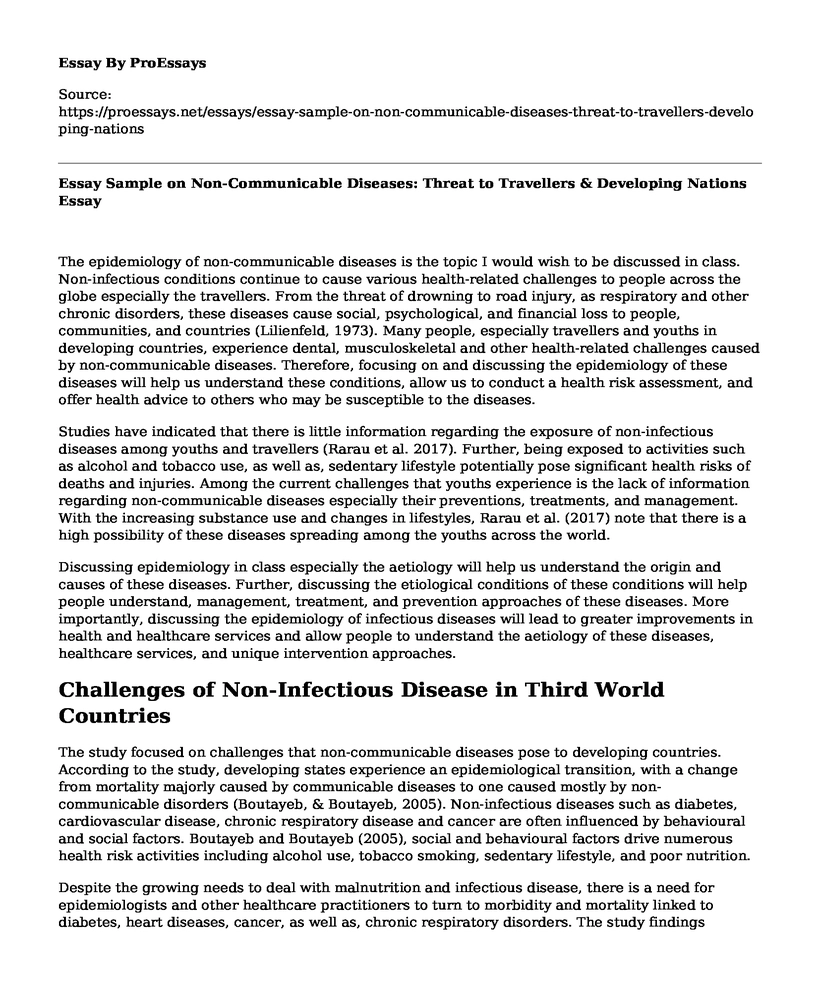The epidemiology of non-communicable diseases is the topic I would wish to be discussed in class. Non-infectious conditions continue to cause various health-related challenges to people across the globe especially the travellers. From the threat of drowning to road injury, as respiratory and other chronic disorders, these diseases cause social, psychological, and financial loss to people, communities, and countries (Lilienfeld, 1973). Many people, especially travellers and youths in developing countries, experience dental, musculoskeletal and other health-related challenges caused by non-communicable diseases. Therefore, focusing on and discussing the epidemiology of these diseases will help us understand these conditions, allow us to conduct a health risk assessment, and offer health advice to others who may be susceptible to the diseases.
Studies have indicated that there is little information regarding the exposure of non-infectious diseases among youths and travellers (Rarau et al. 2017). Further, being exposed to activities such as alcohol and tobacco use, as well as, sedentary lifestyle potentially pose significant health risks of deaths and injuries. Among the current challenges that youths experience is the lack of information regarding non-communicable diseases especially their preventions, treatments, and management. With the increasing substance use and changes in lifestyles, Rarau et al. (2017) note that there is a high possibility of these diseases spreading among the youths across the world.
Discussing epidemiology in class especially the aetiology will help us understand the origin and causes of these diseases. Further, discussing the etiological conditions of these conditions will help people understand, management, treatment, and prevention approaches of these diseases. More importantly, discussing the epidemiology of infectious diseases will lead to greater improvements in health and healthcare services and allow people to understand the aetiology of these diseases, healthcare services, and unique intervention approaches.
Challenges of Non-Infectious Disease in Third World Countries
The study focused on challenges that non-communicable diseases pose to developing countries. According to the study, developing states experience an epidemiological transition, with a change from mortality majorly caused by communicable diseases to one caused mostly by non-communicable disorders (Boutayeb, & Boutayeb, 2005). Non-infectious diseases such as diabetes, cardiovascular disease, chronic respiratory disease and cancer are often influenced by behavioural and social factors. Boutayeb and Boutayeb (2005), social and behavioural factors drive numerous health risk activities including alcohol use, tobacco smoking, sedentary lifestyle, and poor nutrition.
Despite the growing needs to deal with malnutrition and infectious disease, there is a need for epidemiologists and other healthcare practitioners to turn to morbidity and mortality linked to diabetes, heart diseases, cancer, as well as, chronic respiratory disorders. The study findings revealed that there is an urgent need to screen, diagnose, and provide appropriate treatment to individuals suffering from these disorders. Primary prevention approaches should be used to minimize future changes that these diseases pose to families, individuals, societies, and nations. Boutayeb and Boutayeb (2005) noted alcohol and tobacco use commence during the adolescence stage and therefore there is a need to solidify appropriate behaviours to reduce future risks of these diseases.
Although much information is available on the risk behaviours of youths in developing countries, there is a need for vigilance to improve those data systems. Principally, risk factors are majorly focused in areas where the burden of non-communicable diseases have been experienced for an extended period (Boutayeb, & Boutayeb, 2005). Therefore, there is need to pay attention to youth in the third world countries. Essentially, studying the epidemiology of non-communicable diseases will provide a great chance to take research findings, research data, as well as, experiences with interventions to ensure that prevention of non-infectious diseases amongst the youth remains a key and becomes a measurable component of their overall planning. This study is relevant to the selected topic because offers an overview of the epidemiology of non-infectious disorders in developing countries and suggest various measures, interventions, and treatment techniques that can be applied to eradicate or minimize these diseases.
References
Boutayeb, A., & Boutayeb, S. (2005). The burden of communicable and non-communicable diseases in developing countries. International journal for equity in health, 4(1), 2-16. Retrieved from https://doi.org/10.1186/1475-9276-4-2
Lilienfeld, A. M. (1973). Epidemiology of infectious and non-infectious disease: Some comparisons. American Journal of Epidemiology, 97(3), 135-147. doi:10.1093/oxfordjournals.aje.a121494
Rarau, P., Vengiau, G., Gouda, H., Phuanukoonon, S., Kevau, I. H., Bullen, C., ... Pulford, J. (2017). Prevalence of non-communicable disease risk factors in three sites across Papua New Guinea: a cross-sectional study. BMJ Global Health, 2(2), e000221. doi:10.1136/bmjgh-2016-000221
Cite this page
Essay Sample on Non-Communicable Diseases: Threat to Travellers & Developing Nations. (2023, Jan 02). Retrieved from https://proessays.net/essays/essay-sample-on-non-communicable-diseases-threat-to-travellers-developing-nations
If you are the original author of this essay and no longer wish to have it published on the ProEssays website, please click below to request its removal:
- Compare and Contrast Essay on For-Profit Hospitals and Faith Hospitals
- Gastrointestinal Case Study Paper Example
- Essay Sample on Engaging in Social Work: Gaining Gratification Through Charity Work
- Essay Sample on Evidence-Based Practice vs Research: What Nurses Need to Know
- Managing Long-Term Conditions: Medications & Treatment - Essay Sample
- Essay Sample on Interprofessional Collaboration: Enhancing Patient Care & Reducing Medical Errors
- Essay Sample on Care and Compassion in Nursing







